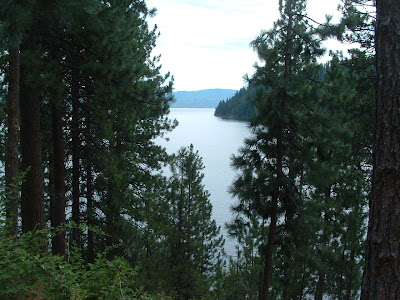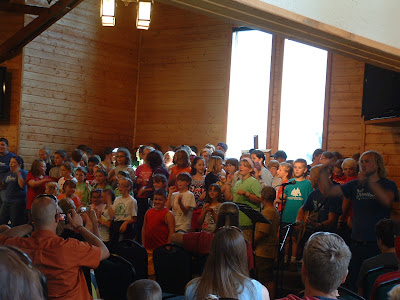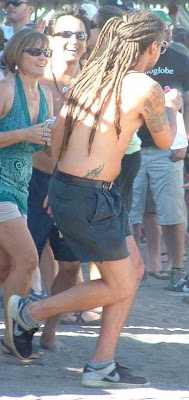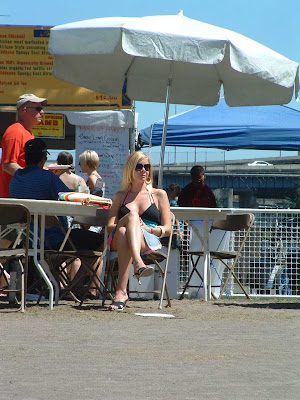It was very interesting to be in Portland for a week. I enjoyed myself immensely. After living so long in an intensely rural location, the hustle and bustle was fun to experience. Yet at the same time, I saw Portland with new eyes because I was looking at it through the lens of preparedness. How much different a city looks when viewed this way!
This concept – how well people can “prepare” while living in a big city – hit home in a moment. My friend Tim (who helped me run the booth during the festival) and I sat stalled on the Morrison Street Bridge over the Willamette River. The Morrison Bridge is a drawbridge, and it was in a lifted position to allow a ship to pass underneath. There was nothing we could do but wait until it closed before we could cross the river into downtown Portland where the festival was being held.

While watching the mighty steel arc into the sky, Tim remarked that, if The Big One (earthquake) should hit Portland, just about every bridge that spanned the river would tumble into the water with unimaginable loss of life. All the bridges, he said, needed to be retrofitted to render them earthquake-proof. But of course Portland, like many cities around the country, is seriously strapped for cash and retrofitting any number of massive bridges just can’t be done.
Tim said that people speak in hushed tones about how the bridges need to be strengthened and updated NOW, and not just because they’re unsuited to withstand an earthquake. Apparently there are whispers about how the bridges are not strong enough to withstand the normal and constant barrage of traffic that crosses them daily.

In fact, Wendy (his wife) had thought about enrolling their seven-year-old daughter in a school across the river, but Tim talked her out of it. “If there should be an earthquake and the bridges go down,” he told her, “we couldn’t get to her [their daughter] at all.” Wendy agreed it was too great a risk.
This kind of thinking is not unusual for folks on the west coast, where earthquakes are a constant and serious threat. But it made me realize just how vulnerable Portland – and every other city – is to disturbance.
Many cities are built on water. Ergo, many cities have massive bridges spanning that water. Most cities have multiple layers of highways that crisscross over each other, hurrying drivers efficiently from one part of the city to another. And it takes but one minor burp for things to grind to a frightening standstill.
I clearly remember the horror of the
Loma Prieta earthquake on October 17, 1989 when some portions of bridges and highways in the Bay Area of California pancaked together. I lived in Sacramento at the time and have many family members in the Bay Area, so it was an up-close and personal concern for me. Many people died. Many others lost limbs as they were literally sawn from crushed vehicles. The carnage was horrible.
Then there’s Hurricane Katrina (or any hurricane, for that matter), where one stalled car could snarl miles and miles of traffic as people fled New Orleans in a panic. (This didn’t count the terrible toll on the people left behind.)
Then there’s the
half-million acre wildfire that devastated southwest Oregon not far from where we used to live, the summer before we left for Idaho.
But at least in circumstances of disaster, people are more likely to help each other. Sure, there are always nasty examples of selfishness, crime, and senseless violence… but there are also beautiful stories of strangers helping strangers, of great feats of heroics, of folks banding together to help others get out of harm’s way. Such is the good and the bad side of humans when a natural disaster or act of terrorism strikes.
But what happens when people turn on each other?
In times of stress when resources (food, water, shelter, money, etc.) are scarce, people are more inclined to develop an every-man-for-himself attitude. It can’t be helped – it’s as much a part of human nature as acts of altruism during disaster.
My friend Wendy and I walked her dog through the peaceful, tree-lined streets near her home and admired the beautiful dwellings. Wendy and Tim live in a small, modest house which abuts a neighborhood of gracious, expensive homes (wonderful for walking dogs and catching up with dear friends). And I wondered… how many of these beautiful homes had even a gallon of water stored away, much less a week’s worth of food?
There are SO MANY people in Portland. And with “only” 2.2 million people for the greater Portland metropolitan area, it’s small by comparison to Los Angeles or Chicago or New York. If things get tough, what can so many people do? Where can they go? How can they get food or water if the grocery stores are stripped bare and utilities are down?
This past week, our nation’s capital reeled from the aftermath of a serious storm that ripped through and left many people in darkness for days. Undoubtedly the grocery stores were stripped. People had no means to boil water, to cook food, to stay cool during the heat wave. How did they do it? And what would happen if the blackout extended beyond six or seven days?
See my point? It doesn’t take TEOTWAWKI. It just takes a bad storm. An earthquake. A hurricane. And pretty soon the milk of human kindness runs thin and folks are kicking in doors, searching for food or looting for valuables.
During my time in Portland, I was completely out of the “loop” of preparedness. I heard no one talking about it, no one wondering about an EMP or other acts of terrorism, no one discussing the prospects of a financial meltdown. Granted I was at a large festival where people came to have fun, and granted “preparedness” is something that one tends to discuss only with those of like mind – but I still managed to overhear a LOT of conversation over four days and those subjects never even came close to the surface.
What I did hear was a lot of shallow talk. I heard discussions about the everyday minutia of life. This is understandable – the everyday minutia of life tend to occupy the bulk of our time and energy. And no one wants to talk about Serious Subjects constantly, or they would walk around in a cloud of depression.
But my overall impression was that “preparedness” wasn’t just underground, it wasn’t even on the horizon. People had concerns about unemployment, about the environment, about the economy… but no one seemed inclined to “do” anything about it in terms of personal preparation. People recognize the problems, but won’t make the next leap of logic. Despite all the evidence that things are getting worse, the overall belief is that someone will fix it and everything will be okay.
While we, as a family, feel more secure because of our rural location, we can’t be smug. This is because such dearly loved friends as Wendy and Tim and their young daughter live in Portland. This is because my extended family lives in the Bay Area and in Southern California. This is because we ALL have loved ones potentially in harm’s way if TSHTF in a city. What can we do?
Nothing. Aside from trying to talk everyone into moving out of the city onto an Idaho homestead (and how likely is that?), there is nothing we can do to help these people prepare. All we can do is ramp up our own preparedness efforts to the point where we can take in friends and family members who have nowhere else to go.



































































